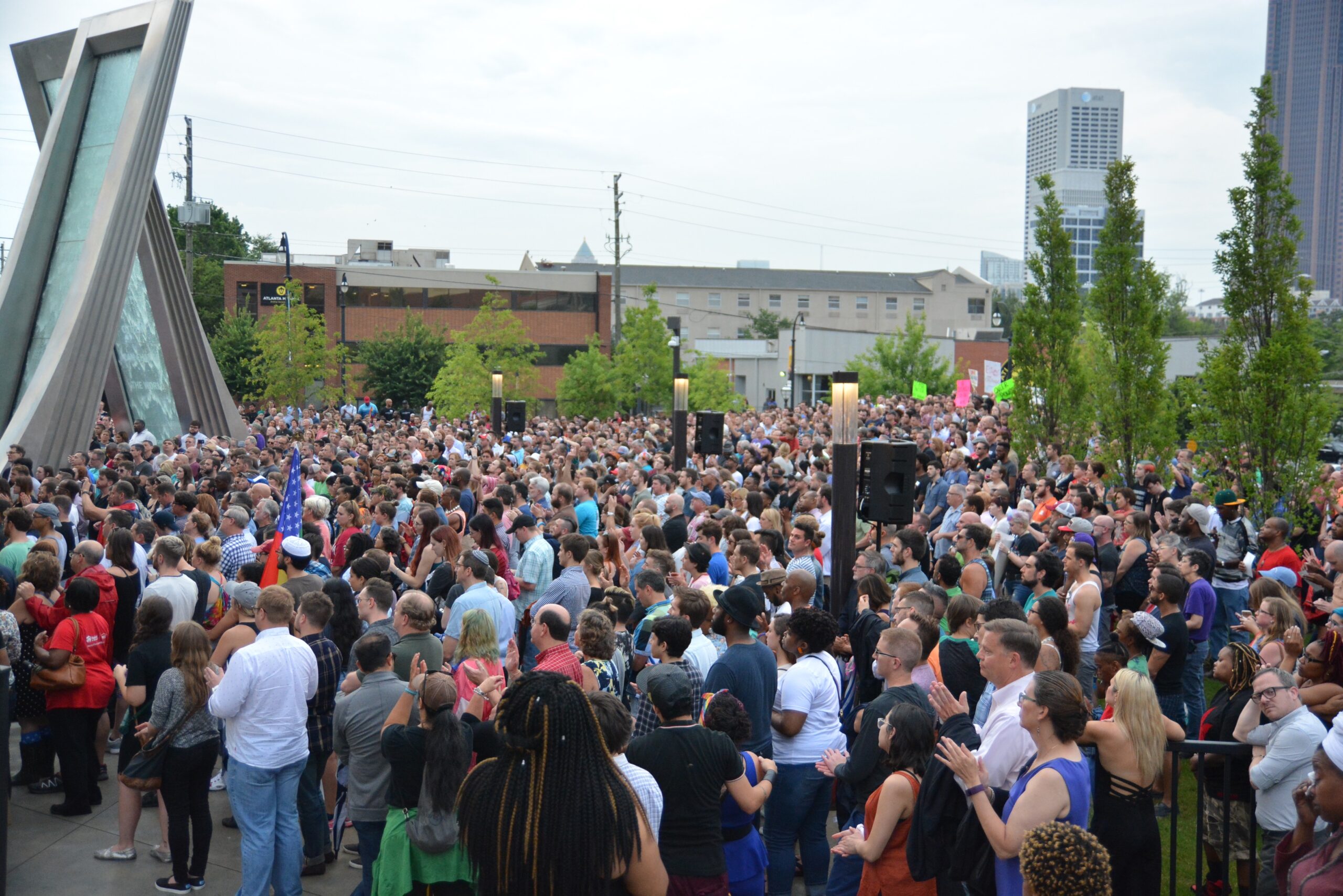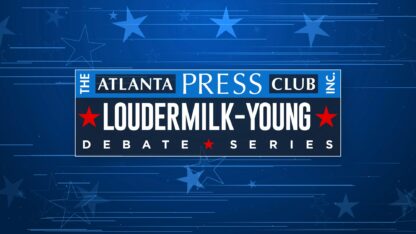Atlanta ‘We Are Orlando’ Vigil Conveyed Message Of Inclusion

Alison Guillory / WABE
Listen to the audio version of this story.
It took seven full minutes for the names of the victims to be read out. Five individual speakers took shifts reading them aloud as a Methodist pastor rang a bell for each name.
More than 2,500 people turned out for the Tuesday night vigil to remember the victims of the Orlando nightclub attack. Heavy rain had let up as the interfaith gathering took place at the National Center for Civil and Human Rights in Atlanta.
Every English-language remark was translated into both Spanish and sign language. Mo Prado of the advocacy group Latino Link was one of several who spoke and provided translation.
“We have a community that doesn’t always understand these functions, doesn’t always understand that they can be included,” Prado, who was raised and came out in Orlando, told WABE.
Inclusion was a major theme at the vigil. Thousands of Atlantans squeezed in near the Center for Civil and Human Rights, with people wrapped around the twin pillars of quotes from Margaret Mead and Nelson Mandela that jut out of the concrete. More were spread across the lawn.
The speakers’ identities ranged from transgender Latina to Native American Two-Spirit to queer, black and Muslim, like Amina Abdul-Jalil.
“When Muslims are interviewed, a lot of what I’m hearing in reports and stuff, it’s the ‘I’m sorries,’ and it’s the ‘Oh, forgive us,’ and ‘Oh, I’m not a terrorist.’ And that gets old,” she said.
Abdul-Jalil had told the crowd it had taken her nearly 40 years to get to the point of being able to speak openly about her intersecting identities.
“I know what it’s like to feel like you have to choose,” she said. “As this crowd filled up this evening and I walked through it, I could see discomfort on some people’s faces. It is the same discomfort that some of the Muslims that I know feel when they know that I’m a married, queer woman.”
She was one of many speakers to emphasize action beyond prayer.
“The work starts after the amen and after the ameen,” said Adbul-Jalil, to applause.
Simone Bell, with the LGBT legal rights group Lambda Legal, reflected on the shock and fear felt by many when hearing the weekend’s news.
“Our greatest fears came true. That the overwhelming amount of hate-speech spewed by elected officials, religious folks, bigots, homophobes and transphobes would reach our family in critical mass ─ that the evil words that have been spoken against us would find their way into the heart and soul of another,” said Bell.
“Our love for each other demands that we fight back. It demands that we stand against irresponsible rhetoric language, ideologies and flat out lies,” she said. “Y’all, we gotta stand together.”
Rabbi Joshua Lesser of Congregation Bet Haverim was one of the main organizing forces of the evening. He said he had ridden his bike to the civil rights center earlier that morning in preparation.
“I saw on the Corey electronic billboard, on my way down DeKalb Avenue, Donald Trump’s face. It just represented this sense of hatred and animus that was coming to town,” said Lesser.
The presumptive presidential nominee, who is due to speak at a rally in Atlanta Wednesday afternoon, has been criticized by some, including President Barack Obama, for his comments following the Orlando attack. Gov. Nathan Deal and U.S. Sen. David Perdue were later scheduled to host a fundraiser for Trump. Perdue cited a scheduling conflict on Tuesday saying a legislative debate over water supply would keep prevent him from attending.
“I believe in planting seeds,” Lesser said. “I believe that part of what happened tonight has broken down some barriers. To see a queer, Muslim woman be hugged by an imam brought tears to my eyes. To have the Latino community so loved and able to come out from a sense of being in the shadows often, I think we were able to shine some light where often there is darkness.”
He said once that happens, “as we know, when we come out of the closet, there’s no going back.” Lesser said what he saw Tuesday night was not only barriers being broken, but that people were thirsting for it.
9(MDAxODM0MDY4MDEyMTY4NDA3MzI3YjkzMw004))








